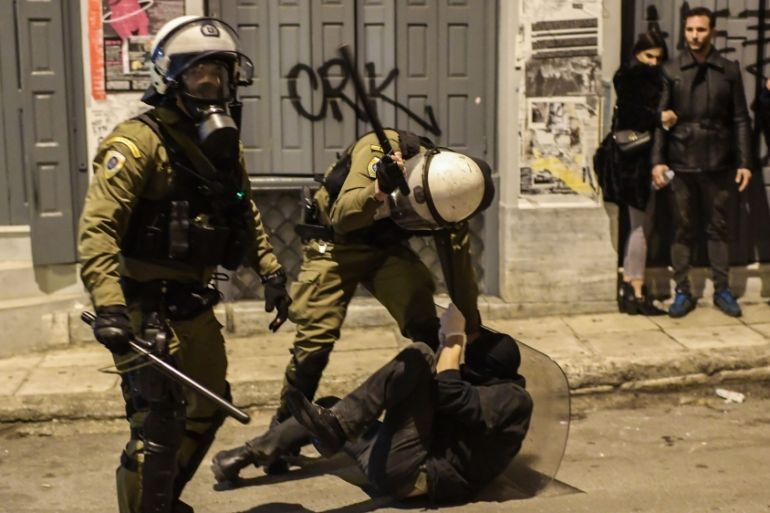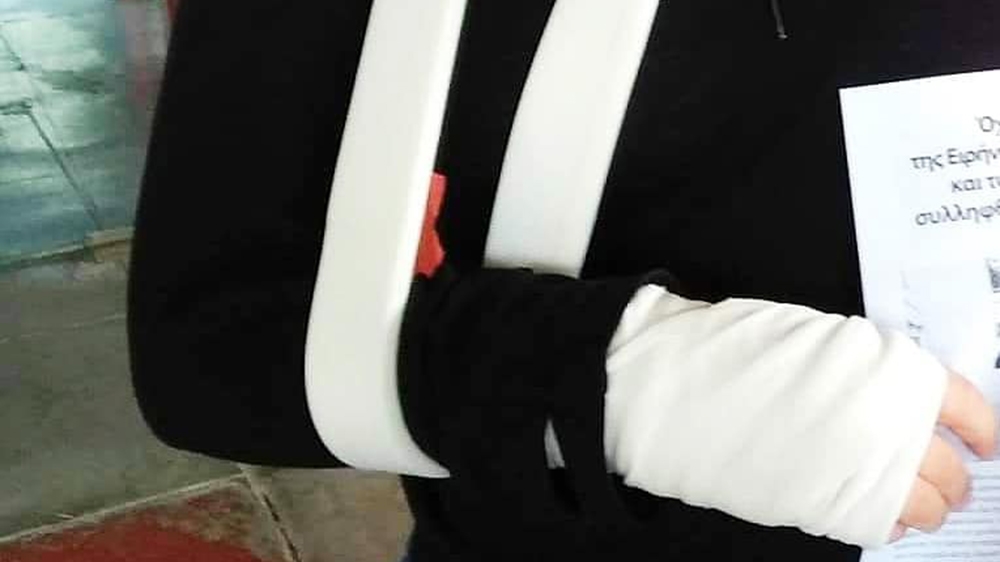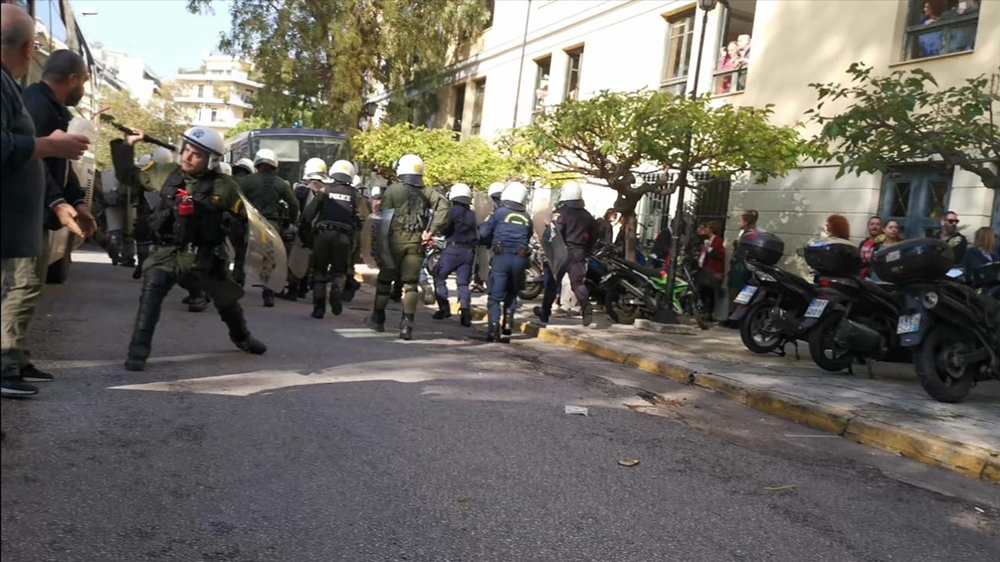Greece: Police accused of excessive force against protesters
Greek citizens, journalists, and international rights groups raise alarm amid growing reports of police-led violence.

Athens, Greece – On November 17, more than 20,000 people marched in Athens to mark 46 years after the Polytechnic Uprising in 1973, when students helped to topple the military government.
About 5,000 extra police were deployed in the Greek capital in anticipation of clashes, particularly in the well-known anarchist enclave of Exarchia, which the ruling New Democracy party has promised to “clean up”.
Keep reading
list of 3 itemsGreece remembers the brutality that felled its dictatorship
Greek police use tear gas on third day of migrants’ protests
Tensions were already high, stirred by the government’s removal of campus asylum in August, a law which had prohibited police from entering universities.
The march, which began near the Polytechnic, ended in Exarchia approximately three hours later. Until then, it had been largely peaceful.
Clashes between protesters and police broke out in Exarchia. Thirty-three people were arrested and two police officers were reportedly injured.
Since last month’s march, several protesters have alleged police-led violence.
Irini Eminidou, a 19-year-old student of Spanish literature, went to a friend’s flat near Exarchia square after the rally. They went to a kiosk to get some food.
“I don’t recall how many people were there at the time, what I can say is that it felt like a normal night in Exarchia. I saw people pass by and a man walking his dog.”
Eminidou says riot police then randomly attacked her.
“Suddenly the police threw tear gas, I couldn’t see my friend and everything was blurred.”
Eminidou says that the police knocked her to the ground, kicked her and stomped on her head.
“I tried to cover my head with my hands and at some point, someone was stepping on my arm and crushing my hand under their boot. The more that I cried for help, the more that they beat me and kicked me.”
Eminidou was arrested along with her friend and about 20 others who were all taken to an underground car park.
“They made us kneel while we were handcuffed,” she said. “It felt like an execution. I thought at this point that they were going to kill us there.”
Eminidou claimed she was then strip-searched by policewomen at the police station and held overnight.

At her lawyer’s insistence, she was taken to hospital at 5am, seven hours after arriving the previous night.
Doctors said she had suffered tissue damage and significant bruising to her arm.
When she spoke to Al Jazeera, she still had bandages on her arm and found it difficult to speak of the experience again.
Marios Aravantinos, a journalist for NewsIT who reported on the march, said riot police attacked him even after he told them that he was a member of the press.
He was near Exarchia square at about 8:30pm when he saw two people on the ground being beaten by the riot police.
“The first thing that came into my mind was to start recording it on my phone, so I started uploading live to Facebook,” he told Al Jazeera. “I could hear their screams so I went towards them to record in a better way. Then someone from the police force realised that I was recording.
“He attacked me with his baton on my left arm, at the same time another one pushed me hard with his shield, I removed my gas mask to tell them ‘I’m press, I’m press’.
“You can hear it clearly in the video. He then hit me hard with something and my phone fell.”
Reported incidents of excessive use of force ... are a disconcerting addition to the long line of individual cases involving human rights abuses by police in Greece.
The situation escalated on November 18, when riot police reportedly attacked people who were waiting outside the court for those who had been arrested the day before.
“They started hitting everybody with no reason with their batons,” said witness Manos Fragioudakis, a reporter for News 24/7. “I saw some policemen at the back asking each other, ‘Why is this happening?’
“This is very strange. I spoke to some other journalists who’ve been working in the field longer than me and no one had seen something like this outside a courthouse. They are so lucky nobody was very injured because some of the police were just hitting people without looking who they were hitting.”
Fragioudakis believes police-led violence has escalated since New Democracy came to power in July.
Al Jazeera contacted Hellenic Police and the Ministry for Citizen Protection about the recent allegations and was directed to a press release announcing a new commission investigating police violence in response to the events outside the courthouse.
The officials did not respond to the allegations of specific attacks or answer whether police would be trained on how to treat journalists.
Lia Gogou, Greece researcher for Amnesty International, told Al Jazeera: “The reported incidents of excessive use of force and ill-treatment against students and individuals and journalists in the area of Exarchia last month are a disconcerting addition to the long line of individual cases involving human rights abuses by police in Greece.
“Amnesty International has been documenting such incidents for many years and, as in previous cases, has called the Greek authorities to conduct prompt, thorough, effective and impartial investigations and to bring perpetrators to justice. Failure to do so will perpetuate the vicious circle of impunity.”
On December 6 – the eleventh anniversary of the death of 15-year-old Alexandros Grigoropolous, who was shot and killed by police in Athens – a crowd of about 4,000 protesters marched through the city.
The protest once again finished in Exarchia. Ten people were arrested and about 13 shops and five ATMs in the city were reportedly vandalised.
There have since been further reports of police-led violence against demonstrators in Exarchia.

The Hellenic Police have said they intend to investigate these claims and asked witnesses to submit relevant material to the Greek Ombudsman.
According to the Greek Code of Police Ethics, police should use “non-violent” means while enforcing the law. The use of force is permitted only when absolutely necessary “to the extent envisaged and required for law enforcement”.
On December 8, in response to a statement from the left-wing Syriza party which condemned police-led violence, the Ministry for Citizen Protection said that amid the threat of “turmoil”, police are safeguarding the city and protecting property from damage.
Michalis Chrysochoidis, the department’s minister, defended the police on his Facebook account, saying they were “enforcing” the law and protecting human rights during the protests on November 17 and December 6. Chrysochoidis referred to alleged that police attacks were “isolated” incidents.
Marios Aravantinos, the journalist who said he was attacked on November 17, said: “We want the police to investigate criminality. What we are asking is that the police do not attack people who have done nothing wrong and even if they had, they need to be arrested and face the proper legal process.”
Reporters Without Borders has issued a statement expressing concern at Aravantinos’s treatment and urged Greek authorities to train police to respect journalists.